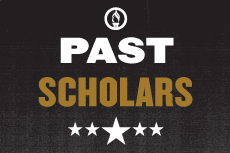Sean Kearney

2012 Goldwater Scholar
Hometown
Carmel, IN
Major
Agricultural and Biological Engineering
College
College of Engineering / Honors College
Why did you apply for the Goldwater Scholarship? In retrospect, I think having the opportunity to write down and reflect on everything I'd been doing was extremely beneficial. Normally, when you're doing undergraduate research, you're mostly focused on cranking out some experiments and getting some interesting results. The Goldwater Scholarship makes you actually think about why the research you're doing is important, and try to contextualize it. It makes you determine what you actually learned from your experiences and how you've grown as a result of doing research in your field. You have to identify what it takes to be a good scientist and prove that you have those characteristics.
What advice would you give to Purdue students thinking of applying? The application allows you to demonstrate how you think about science. I'm of the opinion that it's extremely important to be able to communicate challenging concepts in an understandable way, and that's the approach I attempted with my application. My favorite scientists are Richard Feynman, Isaac Asimov, Steven Strogatz, and Michio Kaku (there are many others). They all try to make science accessible and enticing for people who aren't necessarily scientists. I also listen to Radiolab whenever possible. The common theme here is to remove the idea of the ivory tower in academia - science really is for everyone. When you're applying, try to show that you stand for something, and make it very evident that you want to advance your field and you have some idea of how you can do it
How did you get involved in undergraduate research? In high school, I was introduced to genetic engineering. We did this experiment to transform E. coli so that they would express a gene allowing them to glow in the dark. I thought it would be really cool if you could get them to express other genes - say, to make them degrade hydrocarbons or to produce Prozac or do other cool things. I looked into this idea only to find the international genetically engineered machines (iGEM) competition - an undergraduate competition doing exactly what I had imagined. When I came to Purdue, I joined the iGEM team and had my first experience doing research as a freshman. Follow your interests and abilities and it's fairly easy to find research that suits you.
What are your educational and career goals? I'm becoming more attracted to an academic position - it seems to offer a lot of freedom and autonomy with the kind of work you do. I intend to get my Ph.D., most likely in Biological Engineering with an emphasis on controls and dynamic systems. Teaching would give me the opportunity to share my passions with students and motivate them to accomplish tasks I'd never dreamed possible. I want to increase scientific literacy and engage a wider audience with the power and possibility of science. Technology moves forward, and I don't want to leave anyone behind.